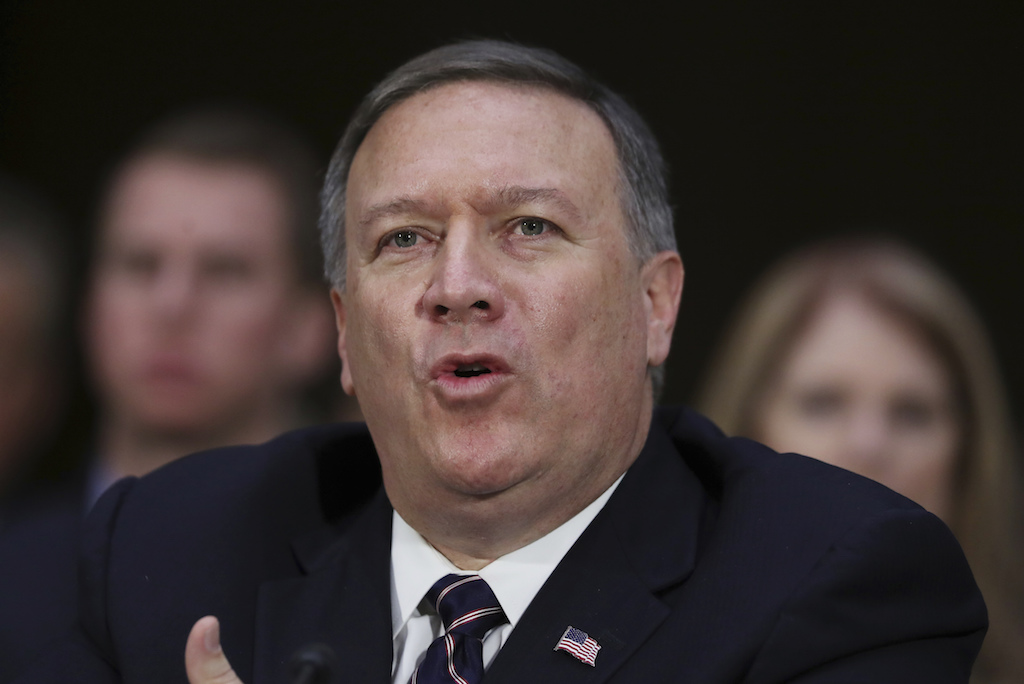Mike Pompeo Is Refusing to Sign Afghan Peace Deal
The pact is risky, and its success is slim, but it might be the best option the U.S. has for ending a horrific war. Secretary of State Mike Pompeo. (Manuel Balce Ceneta / AP)
Secretary of State Mike Pompeo. (Manuel Balce Ceneta / AP)
The death toll from the ongoing, 18-year war in Afghanistan stood at an estimated 147,124 military personnel and civilians in November 2018, according to an analysis from Brown University’s Watson Institute for International and Public Affairs. A 2018 survey from the Pew Research Center found that almost half of Americans believe the U.S. has “mostly failed” in its goals during the war, and Trump was elected on a promise of ending the war.
U.S. Secretary of State Mike Pompeo, however, is so far declining to sign what Time magazine calls a “risky” deal that would wind down, if not end, the conflict.
Zalmay Khalilzad, special representative for Afghanistan reconciliation at the State Department, spent nine months working with Taliban negotiators in Doha, Qatar, on an agreement. “If Trump approves and a deal is struck,” Kimberley Dozier writes in Time Magazine, “it could begin a withdrawal of some 5,400 U.S. troops, roughly a third of the present force, from five bases within 135 days.”
Most troops would leave by November 2020 if the Taliban agrees to three conditions: “Open negotiations with the U.S.-backed Afghan government; reduce violence near areas U.S. forces control, and keep foreign militants out of the areas they control,” multiple current and former U.S., European and Afghan officials told Time on condition of anonymity.
Time explains that some military and intelligence officials believe the deal has multiple downsides. As Dozier says, the current deal, whose details are still closely guarded, “doesn’t guarantee the continued presence of U.S. counterterrorism forces to battle al Qaeda, the survival of the pro-U.S. government in Kabul, or even an end to the fighting in Afghanistan.”
According to a recent report in The Daily Beast, this could also “demoralize the U.S.-backed regime in Kabul and especially the Afghan military and security forces,” who are largely dependent on U.S. support.
“The price of peace,” officials tell Time, “might include reversing much of the hard-won progress toward building a stable country over nearly two decades of war.” Among those risks include declining civil rights, weakening non-Taliban government institutions regionally and locally and increased corruption, among others.
Other international diplomats expressed skepticism of the Taliban’s motives. “The Taliban have been rather rude with the U.S. throughout the peace process, because they have the impression that a withdrawal deal is a desperate desire of the USA, not the Taliban,” a senior European diplomat in Kabul told The Daily Beast.
Those concerns aside, Time concludes that “the agreement may be the best deal the U.S. and its allies can get to head off a pre-emptive pullout of U.S. troops in time for the 2020 U.S. elections.”
The American military, Dozier continues, “[know] they need to reduce the number of troops to a smaller, cheaper footprint to mollify U.S. policymakers tired of writing checks after 18 years of war, and a U.S. public that doesn’t understand why the troops are still there.”
While Pompeo did not comment pre-publication, after the Time story was released, State Department spokesperson Morgan Ortagus told Time in an email that there is still a chance that Pompeo could change his mind.
Ortagus wrote: “There is no agreement to sign yet. If and when there is an agreement that is approved by all parties, including President Trump and if the Secretary is the appropriate signatory, he will sign it.”
Of course, much of this outcome depends on the often-mercurial president. “It isn’t over and done until Trump says it is,” a U.S. official with knowledge of the talks explained to The Daily Beast, “and as we know, the president’s thoughts on big deals like this often change at the last minute.”
Your support matters…Independent journalism is under threat and overshadowed by heavily funded mainstream media.
You can help level the playing field. Become a member.
Your tax-deductible contribution keeps us digging beneath the headlines to give you thought-provoking, investigative reporting and analysis that unearths what's really happening- without compromise.
Give today to support our courageous, independent journalists.






You need to be a supporter to comment.
There are currently no responses to this article.
Be the first to respond.